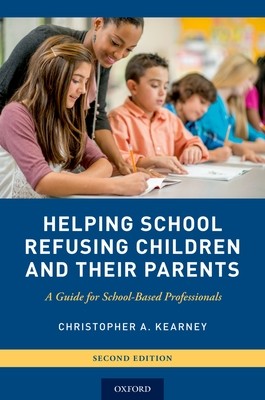
- We will send in 10–14 business days.
- Author: Christopher A Kearney
- Publisher: Oxford University Press, USA
- ISBN-10: 0190662050
- ISBN-13: 9780190662059
- Format: 15.5 x 23.1 x 1.3 cm, softcover
- Language: English
- SAVE -10% with code: EXTRA
Helping School Refusing Children and Their Parents (e-book) (used book) | bookbook.eu
Reviews
Description
Children who miss substantial amounts of school pose one of the most vexing problems for school officials. In many cases, school personnel must assess these students and successfully help them to return to the academic setting. This can be difficult considering most school-based professionals are pressed for time and do not have access to proper resources. The information in this book can help school officials combat absenteeism and reduce overall dropout rates.
Designed for guidance counselors, teachers, principals and deans, school psychologists, school-based social workers, and other school professionals, Helping School-Refusing Children and Their Parents outlines various strategies for helping children get back to school with less distress, all of which can be easily implemented in schools. This fully-updated second edition provides recommendations for a multi-tiered approach to school absenteeism that concentrates on prevention (Tier 1), early intervention for emerging cases (Tier 2), and more extensive intervention and systemic strategies for severe cases (Tier 3), with each tier based on empirically supported strategies grounded in scientific research. A chapter on assessment describes several methods for identifying school refusal behavior, including time-limited techniques for school officials who have little opportunity to conduct detailed evaluations. Worksheets for facilitating assessment are included and can easily be photocopiedfrom the book. Other chapters provide advice for working collaboratively with parents, preventing relapse, and special issues. Topics such as poverty, homelessness, teenage pregnancy, violence, and school safety are also addressed, as are individualized education or 505 plans and consultation with other clinicians.
EXTRA 10 % discount with code: EXTRA
The promotion ends in 17d.00:12:08
The discount code is valid when purchasing from 10 €. Discounts do not stack.
- Author: Christopher A Kearney
- Publisher: Oxford University Press, USA
- ISBN-10: 0190662050
- ISBN-13: 9780190662059
- Format: 15.5 x 23.1 x 1.3 cm, softcover
- Language: English English
Children who miss substantial amounts of school pose one of the most vexing problems for school officials. In many cases, school personnel must assess these students and successfully help them to return to the academic setting. This can be difficult considering most school-based professionals are pressed for time and do not have access to proper resources. The information in this book can help school officials combat absenteeism and reduce overall dropout rates.
Designed for guidance counselors, teachers, principals and deans, school psychologists, school-based social workers, and other school professionals, Helping School-Refusing Children and Their Parents outlines various strategies for helping children get back to school with less distress, all of which can be easily implemented in schools. This fully-updated second edition provides recommendations for a multi-tiered approach to school absenteeism that concentrates on prevention (Tier 1), early intervention for emerging cases (Tier 2), and more extensive intervention and systemic strategies for severe cases (Tier 3), with each tier based on empirically supported strategies grounded in scientific research. A chapter on assessment describes several methods for identifying school refusal behavior, including time-limited techniques for school officials who have little opportunity to conduct detailed evaluations. Worksheets for facilitating assessment are included and can easily be photocopiedfrom the book. Other chapters provide advice for working collaboratively with parents, preventing relapse, and special issues. Topics such as poverty, homelessness, teenage pregnancy, violence, and school safety are also addressed, as are individualized education or 505 plans and consultation with other clinicians.


Reviews